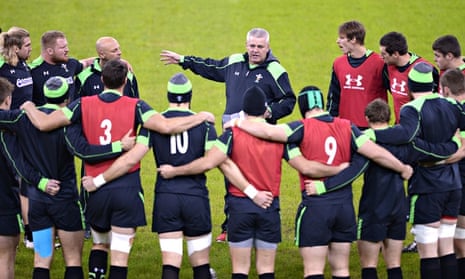As Warren Gatland spoke this week of the pressure he puts himself under to end a run of 22 successive defeats against the leading southern hemisphere nations, those at the media call who had been covering Wales for rather longer than the seven years the New Zealander has been in charge were able to reflect that he has failed to reverse a trend rather than started one.
Wales end their autumn series on Saturday against South Africa, a country they have defeated once in 108 years of fixtures. Five months ago, Gatland’s men led the Springboks 17-0 in Nelspruit at one stage – only to lose the game to a late penalty try. Back in 1998, Wales were 14 points up on South Africa at Wembley before succumbing to a late try and a penalty.
Gatland is only too aware that his record of one victory in 27 Tests against New Zealand, South Africa and Australia is not just unimpressive but a hindrance to fulfilling his ambition of going one better than 2011 and reaching the World Cup final next year. They are in the same group as England and Australia; the hosts and a team who have found a way of defeating Wales in the closing stages of a match time and again.
Wales were unimpressed with a question asked by the BBC reporter Sonja McLaughlan immediately after last Saturday’s defeat to New Zealand. Did Gatland feel under pressure by the run of reverses? The subsequent media brouhaha that developed was down to the Welsh Rugby Union’s touchy PR setup rather than the head coach but, as debate raged in the country about whether Gatland had taken the side as far as he were able, a moment of reflection was called for.
Wales’s success record against the Sanzar nations under Gatland is 3.7%. The rate is little better in the professional era – 6.1% (three victories in 57 Tests); and while the overall record is 15.5%, it is some way below mediocre. Up to 1987, Wales had a winning record over Australia of 8-5; since then, they have beaten the Wallabies twice and South Africa only once.
What Wales have become under Gatland is consistently competitive against Australia and South Africa, and not just at the Millennium Stadium. They were leading in their last matches against South Africa and Australia with less than 10 minutes to go and they were 16-15 up on New Zealand after 69 minutes last Saturday.
Wales are better prepared under Gatland than before, his selection policy is consistent and the team are cohesive. Their conditioning programme is impressive, their training facilities are up there with the best, they have won three Six Nations titles in the past seven years and reached the 2011 World Cup semi-finals, and they provided the nucleus of the Lions team that won the series against Australia last year.
It is at the point when a match reaches the stage when fatigue, mental and physical, sets in, and it becomes about what lies deep within, that Wales lose their grip, in contrast to South Africa who have beaten Wales, Australia, Argentina, New Zealand and England this year late on, although they also lost to the Wallabies to a last-minute try in Perth. They are vulnerable when a Test swivels on playing rather than coaching.
When Wales were going through an indifferent period a year before the last World Cup, Gatland changed his approach. He had operated with a tight rein after taking over following Wales’s failure to reach the knockout stage of the 2007 tournament but after a couple of years decided to give the players more slack, involving them in aspects like gameplans in the hope it would improve decision-making on the field.
It did not and he came to reflect, like a member of the previous management team, Nigel Davies, that the players preferred to be led and be pointed in a direction rather than chart their own course. It did not used to be like that in Wales but Gatland is operating at a time when the level below the national side is so rickety that the Cardiff Blues’ coach, Mark Hammett, another Kiwi, this month remarked that the game in Wales is 15 years behind New Zealand.
If the pressure is on Gatland to get that elusive victory – and he can take encouragement from South Africa’s lack of experience on the bench, which should benefit Wales in the final 10 minutes – it should also be on his players. They have the experience as well as the ability, even if they are without Richard Hibbard in the front row and George North on the wing. Key figures, such as Dan Biggar, Jamie Roberts and Leigh Halfpenny, need to see clearly when the fog of fatigue falls, watching and waiting.
Gatland has done his bit: it is down to those wearing the jersey to take responsibility. If they don’t, the long wait will go on.

